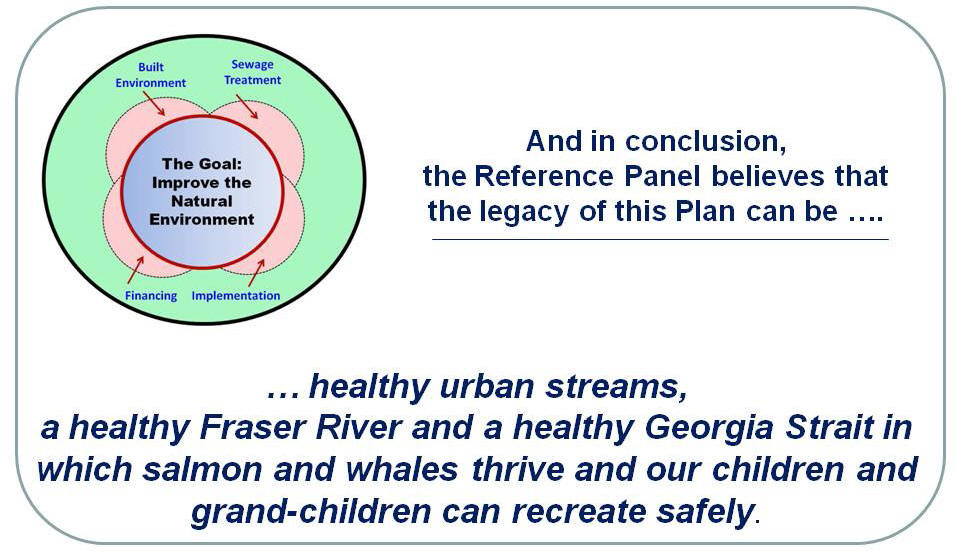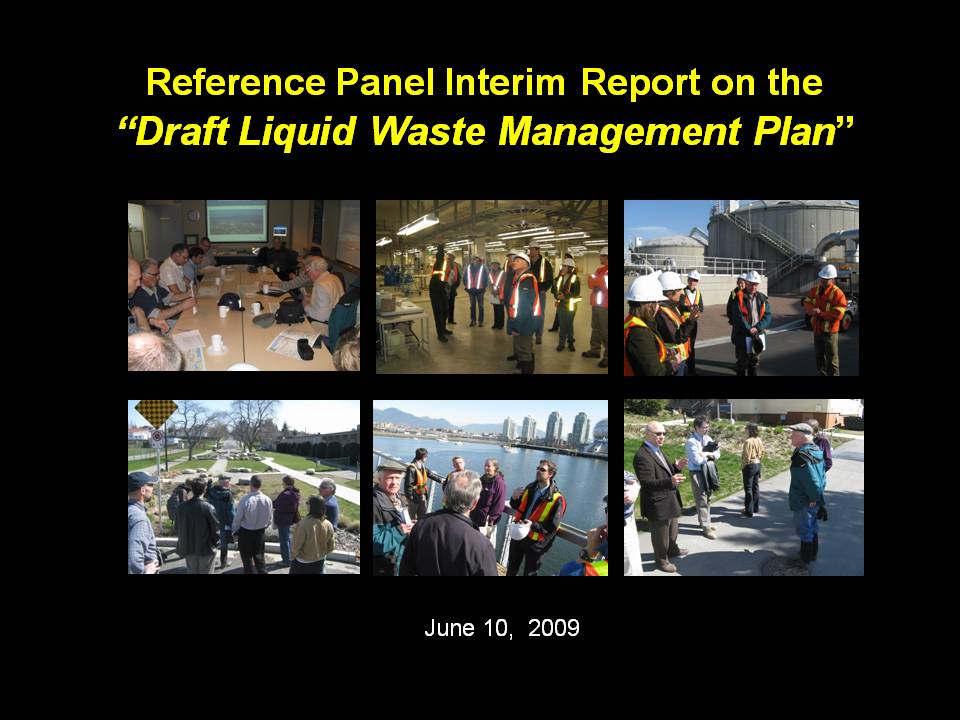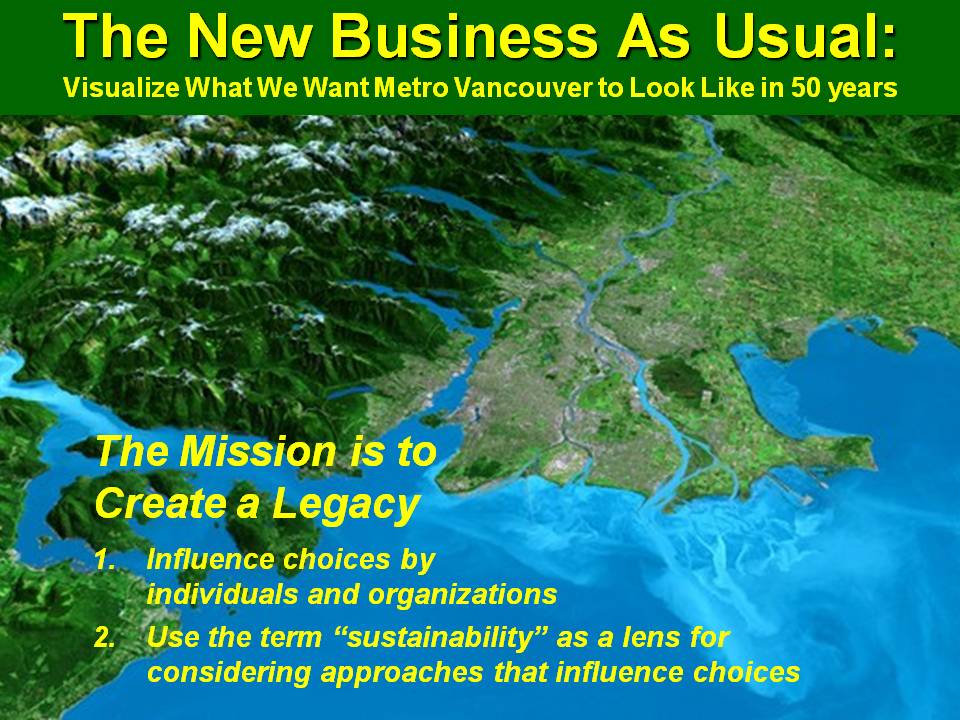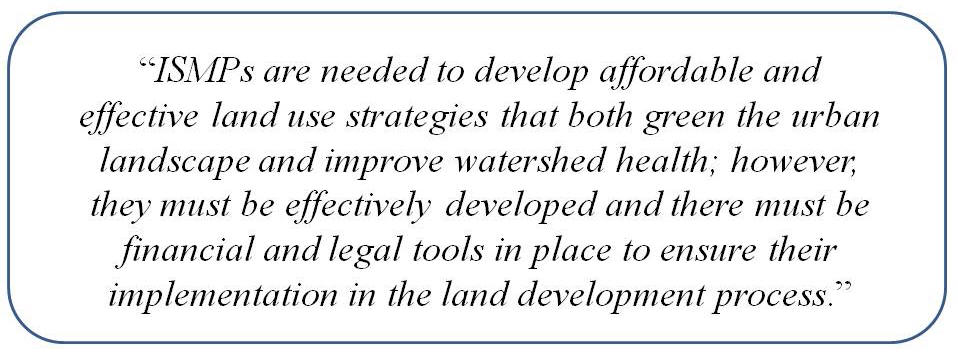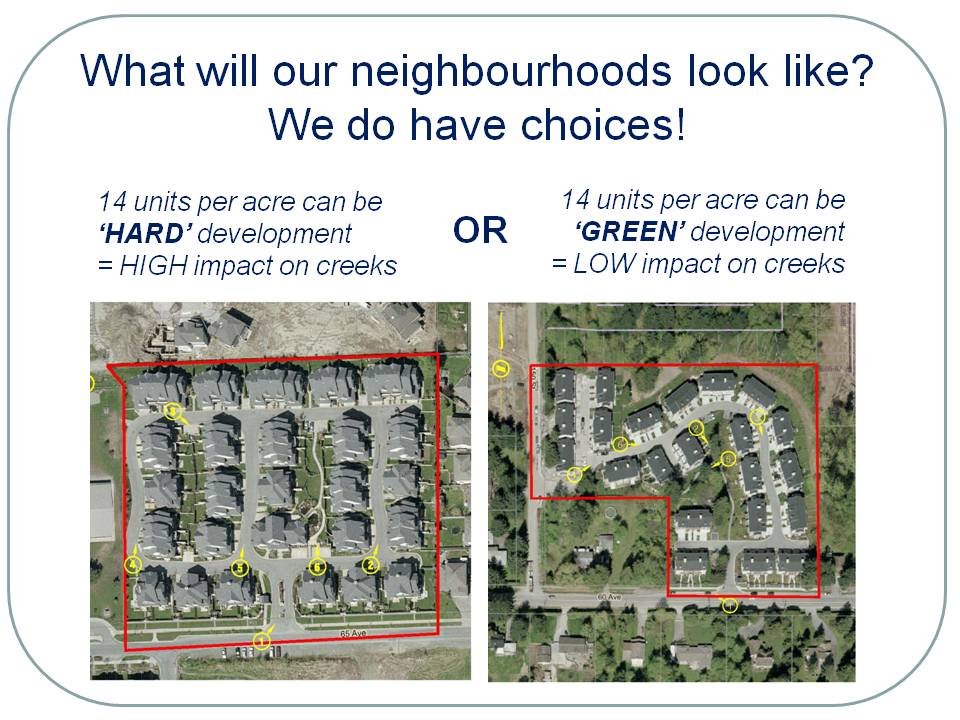Re-Focus Integrated Stormwater Management Plans on outcomes, recommends Metro Vancouver Reference Panel
Note to Reader:
To download a PDF version of the the following web story, click on Re-Focus Integrated Stormwater Management Plans on Outcomes
Sustainable Region Vision
Appointed by the Metro Vancouver Regional Board in April 2008 to provide independent advice and recommendations regarding the management of liquid wastes and rainwater, the Liquid Waste Management Reference Panel presented their Interim Report on A Liquid Resource Management Plan for Metro Vancouver on June 10, 2009.
“The Reference Panel has developed an action-oriented policy framework that comprises 19 recommendations in five theme areas,” stated Kim Stephens, Reference Panel Chair. “For each of the five theme areas, we have identified a tag-line to describe the shift from the old to a new way of doing business…so that we will achieve the Sustainable Region Vision for managing sewage and rainwater as resources, not waste.”
“The strategies and actions in the Plan will have an impact on Metro Vancouver’s sustainability for generations to come. Hence, it is important to link those actions to 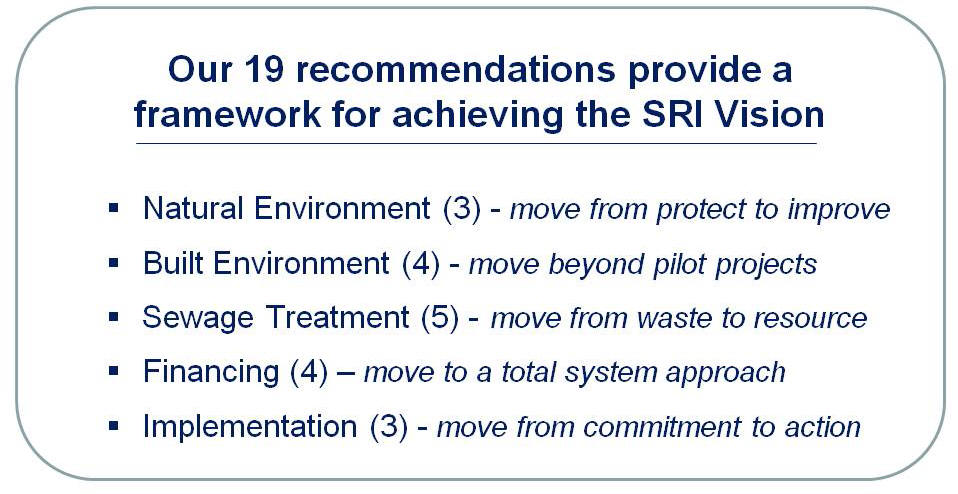 a picture of a desired outcome that will inspire people to strive for constant improvement – this is what we want our region to look like, and this is how we will get there.”
a picture of a desired outcome that will inspire people to strive for constant improvement – this is what we want our region to look like, and this is how we will get there.”
To Learn More:
To read the complete story of the Reference Panel presentation of their Interim Report, click on Advisory group proposes framework for more integration and action to achieve the Sustainable Region Vision.
Built Environment – Move Beyond Pilot Projects
The tag line for the Built Environment is ‘move beyond pilot projects’. The Reference Panel is very clear in its call for action to re-focus Integrated RAINwater/Stormwater Management Plans on watershed targets and outcomes so that there are clear linkages with the land use planning and development approval process.
As explained by Kim Stephens, “Three complementary recommendations underpin the goal of moving beyond pilot projects to a watershed-based approach to achieving performance targets for rainwater management and green infrastructure. Bringing this to fruition requires coordinated action.”
Protect Watershed Health (#5)
The Liquid Waste Management Plan approved in 2002 included a commitment by Metro Vancouver municipalities to integrate land use and drainage planning. This was the genesis for Integrated Stormwater Management Plans (ISMPs).
“When the Reference Panel reported back to the Waste Management Committee in July 2008, we identified the ISMP process as a sleeper issue because there are  130 watersheds in the region; and continuation of the old-business-as-usual would potentially result in an aggregate unfunded liability that could easily equal the $1.4 billion cost of sewage treatment,” states Kim Stephens. “We used the elephant in the room analogy to make the point that the issue is known, but there seems to be a reluctance to tell it like it is.”
130 watersheds in the region; and continuation of the old-business-as-usual would potentially result in an aggregate unfunded liability that could easily equal the $1.4 billion cost of sewage treatment,” states Kim Stephens. “We used the elephant in the room analogy to make the point that the issue is known, but there seems to be a reluctance to tell it like it is.”
The Reference Panel also brought the ISMP concern to the attention of the Regional Engineers Advisory Committee (REAC) in a February 2009 meeting.
Getting It Right:
When updating the Waste Management Committee in June 2009, Kim Stephens drew their attention to this statement in the Interim Report:
“Unfortunately, ISMPs completed to date have tended to be engineering-centric, and in general can be described as glorified master drainage plans. ISMPs that do not integrate land use and drainage planning are resulting in unaffordable infrastructure budget items that become liabilities, without providing offsetting stream health benefits.”
 “For example, Surrey has completed three ISMPs. Surrey staff describes the three plans as being totally different in terms of approach and results. As the Reference Panel highlighted in the July 2008 meeting, the outcome-oriented Fergus Creek got it right and is a provincial pilot for integration. That’s the good news.
“For example, Surrey has completed three ISMPs. Surrey staff describes the three plans as being totally different in terms of approach and results. As the Reference Panel highlighted in the July 2008 meeting, the outcome-oriented Fergus Creek got it right and is a provincial pilot for integration. That’s the good news.
“Then there is the plan that proposed an unacceptable and unaffordable $26 million engineering solution at the top of a watershed. That’s the downside of an engineering-centric approach not connecting the dots.”
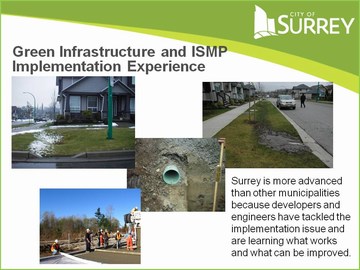
Lessons Learned:
“To do an ISMP right, one has to start with the desired outcome – which is protect or improve stream health – and then determine what actions in the watershed will green the urban landscape. The Fergus Creek plan stands out because it is based on implementing green solutions as an alternative to conventional engineered blue solutions (that require large areas of land to build expensive ponds).”
“The City of Surrey has completed plans at watershed, catchment and neighbourhood scales… that demonstrate how innovative and effective applications of green infrastructure for rainwater infiltration….. can eliminate the need for ponds, thereby resulting in multi-million capital savings. In a region that is land-short, this is a significant driver for doing business differently.”
“The region now has seven years of ISMP experience to reflect upon. The message is clear – we believe the ISMP process has gone off track from what was originally intended. It is therefore time to re-focus ISMPs on watershed targets and outcomes – what will our neighbourhoods look like, and how will we change the built-form.”
“Once we know what we want our watersheds and neighbourhoods to look like, the next step is to decide what the tools are that will get us there,” concluded Kim Stephens.
Implement Regional Team Approach (#6)
The Stormwater Interagency Liaison Group (SILG) was created under the Liquid Waste Management Plan approved in 2002. The SILG mandate is to assist with municipal implementation of actions focused on rainwater/stormwater management.
In the early 2000s, SILG was the driving force behind the development of approaches and tools that have made BC a leader in the field of rainwater management and green infrastructure. A notable example is the Water Balance Model for British Columbia. Started by SILG in 2001, this decison support tool has morphed into an inter-provincial partnership initiative; and in 2009 received a Premier’s Award for Innovation & Excellence.
Reference Panel Recommendation #6 is to mandate a renamed and ‘new SILG’ to spearhead a regional team approach to develop policy, legal and technical tools that will enable ‘integrated solutions’ for rainwater management, green infrastructure and integrated resource recovery.
Align Goals and Actions:
The Metro Vancouver Water Balance Model Forum, hosted by the City of Surrey in March 2009, was a first step in advancing a regional team approach to rainwater management and green infrastructure – an approach that would align local actions in Metro Vancouver with provincial goals as stated in Living Water Smart, BC’s Water Plan. Proposed next steps include additional regional forums that would be organized in collaboration with SILG.

Achieve Region-Wide Consistency (#7)
Reference Panel Recommendation #7 is to implement a consistent region-wide approach to neighbourhood (re)development and building design that integrates rainwater management, green infrastructure and integrated resource recovery.
The Interim Report states that these linkages must be made as early in the planning and development process as possible, so that feasibility is maximized.
The Interim Report also points out that municipalities will have to provide developers and property owners with guidance as to how watershed-specific targets established through Integrated RAINwater/Stormwater Management Plans and Integrated Resource Recovery targets identified in business cases can be met at the development scale.
Shared Responsibility:
The Surrey Forum introduced the framework for a Responsibility Matrix that regulators, developers and designers would be able to use as a decision support tool. There are solutions to be found, if the different parties/ departments/ local governments and regions simply talk to each other about how they could all work together more effectively.
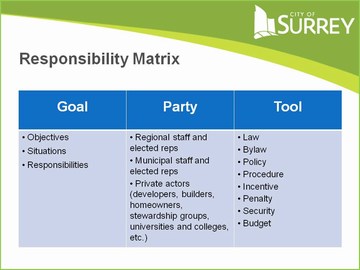
About the Reference Panel
 The Metro Vancouver Liquid Waste Management Reference Panel is a community advisory group that brings expert knowledge and relevant experience in liquid waste/resource and rainwater management. “We provide a blend of technical, legal, scientific, academic, business, industry and community perspectives and values,” states Susan Rutherford (of West Coast Environmental Law), a lawyer and non-governmental organization representative on the Reference Panel, and a member of the Green Infrastructure Partnership Steering Committee..
The Metro Vancouver Liquid Waste Management Reference Panel is a community advisory group that brings expert knowledge and relevant experience in liquid waste/resource and rainwater management. “We provide a blend of technical, legal, scientific, academic, business, industry and community perspectives and values,” states Susan Rutherford (of West Coast Environmental Law), a lawyer and non-governmental organization representative on the Reference Panel, and a member of the Green Infrastructure Partnership Steering Committee..
 “To help everyone focus on the ultimate goal – which is improve the natural environment – the Reference Panel has created a branding graphic for the final Plan. This shows the elements which must be integrated if we are to ensure that it will be a great Plan,” explains Christianne Wilhelmson, Reference Panel Co-Chair, and Managing Director for the Georgia Strait Alliance.
“To help everyone focus on the ultimate goal – which is improve the natural environment – the Reference Panel has created a branding graphic for the final Plan. This shows the elements which must be integrated if we are to ensure that it will be a great Plan,” explains Christianne Wilhelmson, Reference Panel Co-Chair, and Managing Director for the Georgia Strait Alliance.
“Each of these elements – the built environment, sewage treatment, financing and implementation – are represented in the Plan, however unless they are integrated to a greater degree in the actions, the goal of protecting the environment will not be achieved as it has to be.”


